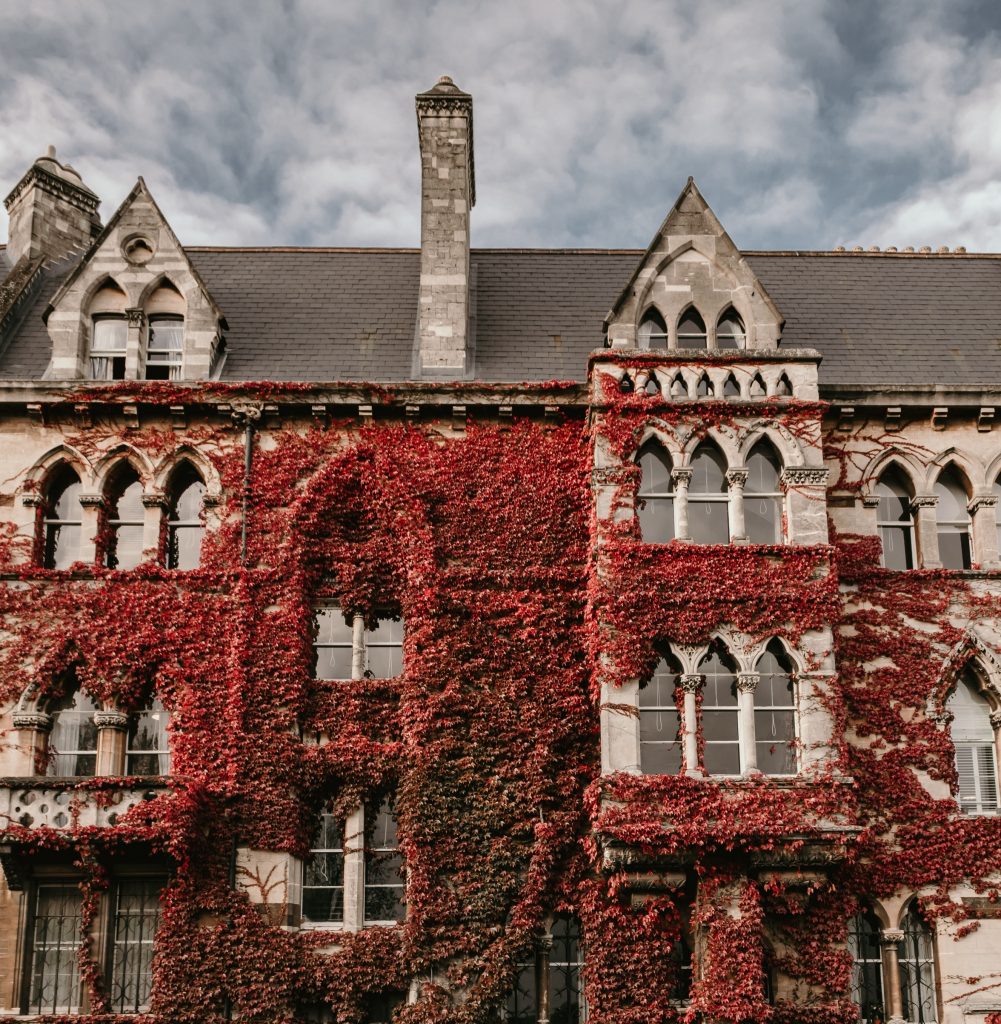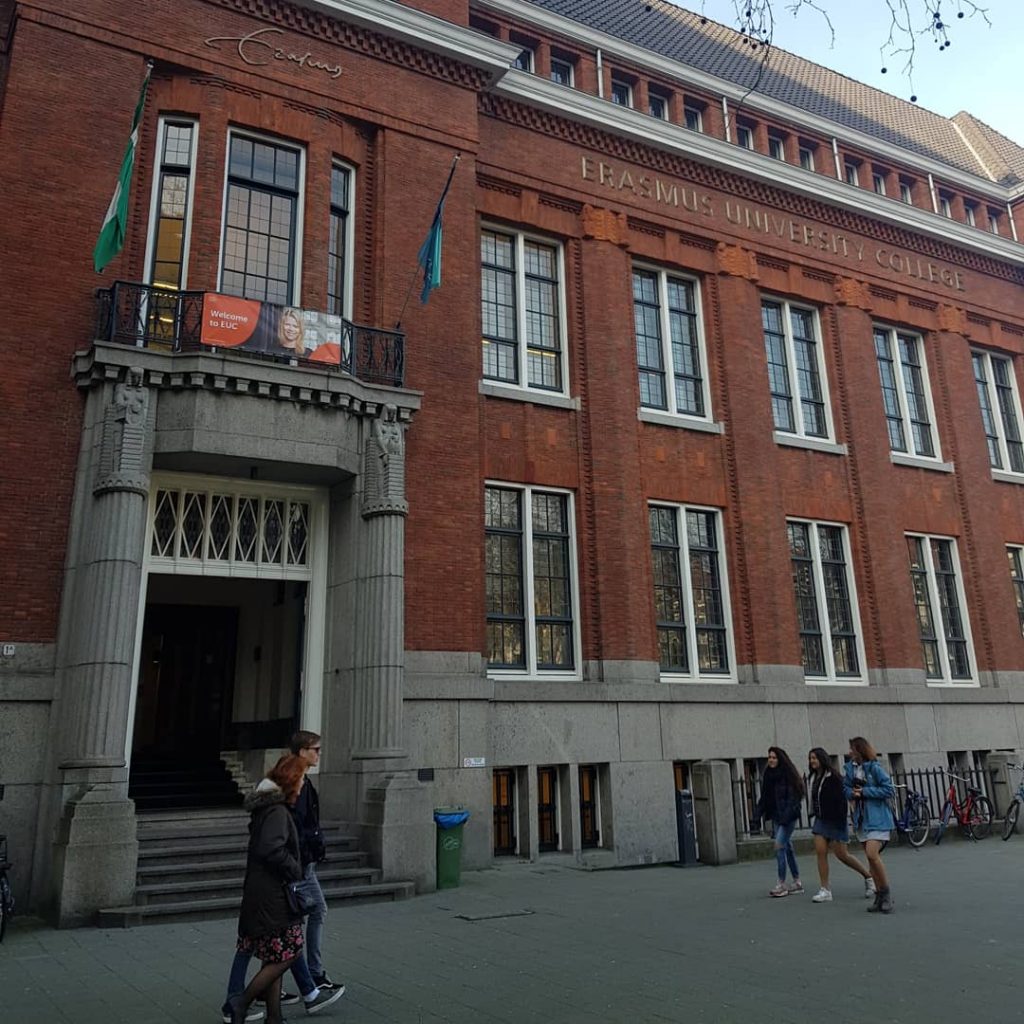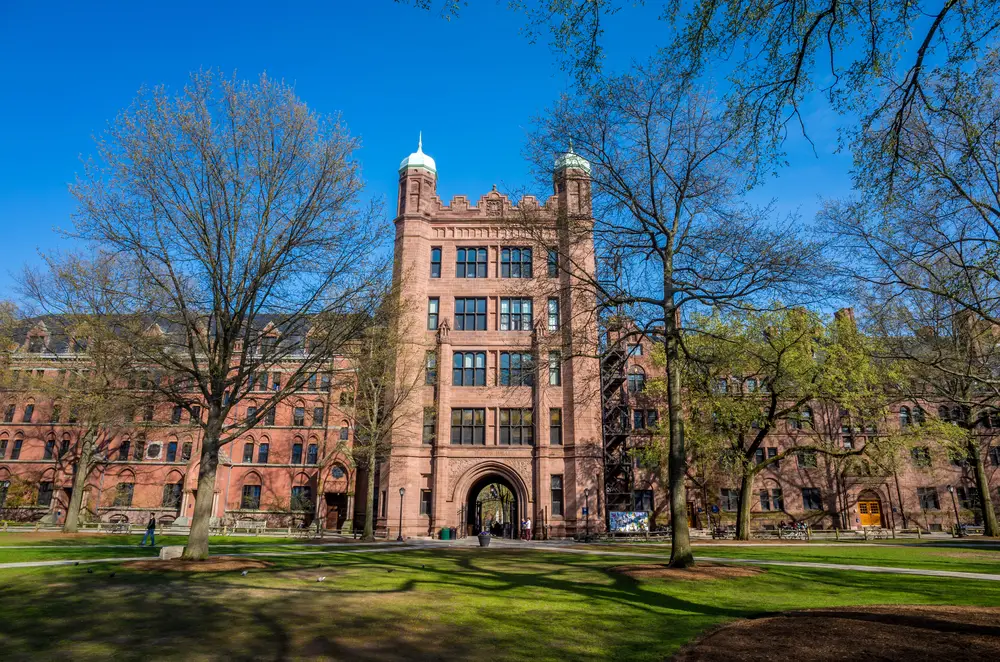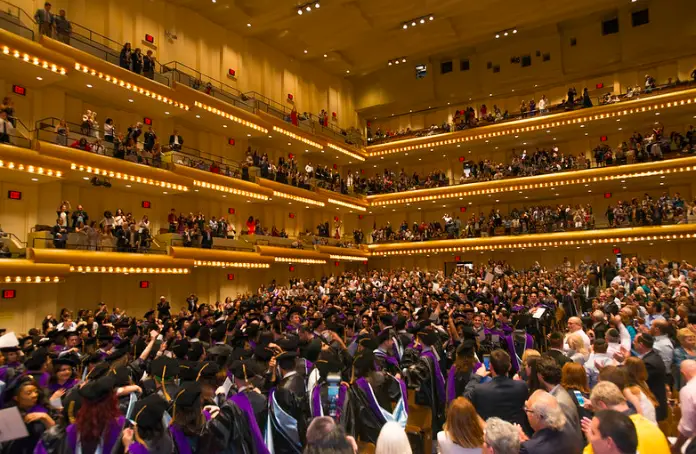Study at ESADE Barcelona
A European business school in the heart of Barcelona

ESADE Barcelona is one of the best Business schools in Europe.
With over 9,000 students – including more than 3,000 international students and nearly 110 nationalities, ESADE (Escola Superior d’Administració i Direcció d’Empreses) is a private Jesuit educational institution within the Ramon Llull University located in Barcelona, Spain. The school was started by a group of like-minded professionals and entrepreneurs and is now training the rising stars not only in Spain but indeed from around Europe, Asia and the world.
From its inception it has kept one goal in mind: adopter une approche humaine dans la formation de professionnels capables de s’adapter à un monde en perpétuelle évolution. At ESADE, the numbers speak for themselves: #3 Masters in Management (QS World University Rankings 2018 and #6 Masters in Finance. After ESADE, moreover, 93% of business school students find a job within 3 months of graduating and 80% before they even graduate.

ESADE Barcelona
ESADE Alumni run ESADE BAN (Business Angel Network), the Best Performing Business Angels Network in Europe. The network of nearly 250 business angels hosts multiple investment forums where entrepreneurs can get together, find out about projects, and foster and channel investment. Annually the network analyzes about 600 projects a year. In less than a decade, the network has invested more than 22 million in more than 100 start-ups including particularly Wuaki.tv, Wallapop, Signaturit, Wave and RedPoints in such areas as energy efficiency, healthcare, social impact and technology.
Academics:
ESADE prides itself in the “ESADE Difference”, namely, focusing on comprehensive training, languages, internships, experiences abroad, learning by doing and training in specific legal skills.
ESADE offers Bachelor’s: BBA – Law, BBA & Law, Law & Global Governance – and Master’s – MBA and multiple MSc programs in Management programs. Due to its success, the school has expanded to Madrid and Buenos Aires, campuses that largely offer executive education degrees.
ESADE’s MSc Programmes in Management are innovative one-year programmes delivered entirely in English at the Barcelona-Sant Cugat campus for recent graduates who are starting out on their professional career. There are six different Master of Science programmes: Business Analytics, Finance, Global Strategic Management, Innovation & Entrepreneurship, International Management, Marketing Management.
While on campus, students will be encouraged to innovate as ESADE literally creates space for it. With more than 18,000m2 of dedicated designed for entrepreneurs including in the EGarage – “the entrepreneur’s garage”, students will find ample space on campus to work together and develop their ideas.
True to its European identity, thanks to its international strategic alliances, the institution offers multiple dual diploma courses with a group of prestigious European institutions including HEC Paris, Bocconi University in Milan, the University of Saint-Gall, The Erasmus University of Rotterdam which form a consortium allowing students to obtain a double degree
Campus life
Combining beaches, mountains, history, spectacular architecture and wonderful food, ESADE’s home in Barcelona offers more than enough to keep you busy in your free time. On campus, a large range of options are at your fingertips: from sports, leisure and cultural associations to young entrepreneurs and volunteer work associations. Many of these groups collaborate with other universities around the world.
The school aims to promote both social responsibility and sustainability. ESADE is a signatory to the United Nations Global Compact and to the Principles for Responsible Management Education (PRME), a global network of universities and business schools that is committed to integrating social responsibility, ethics and sustainability into education. It has also joined the United Nations Higher Education Sustainability Initiative (Rio+20). Finally, ESADE is committed to training people who are aware of their responsibilities as citizens and as professionals and capable of contributing significantly through their careers to meeting society’s needs.
ESADE has two campuses: the Barcelona-Pedralbes Campus and the Barcelona-Sant Cugat Campus. Bachelor in Law students study at the Barcelona-Pedralbes Campus and the Bachelor of Business Administration (bilingual and English options) is taught at the Barcelona-Sant Cugat Campus.
The Barcelona-Pedralbes Campus is located in an attractive, residential area, 15 minutes from Barcelona city centre just off the Avenida Diagonal, the heart of the city’s business and shopping district. The classrooms, study areas and simulation courtrooms are equipped with the latest technology. In addition, students have access to one of the largest bibliographical and documentary services specialised in law.
Business Administration is taught at the Barcelona-Sant Cugat Campus. Located 15 kilometers from Barcelona, the campus was designed to facilitate interaction between the students and the business world, as the business innovation park (ESADECREAPOLIS) is located next to the university buildings.
Sant Cugat del Vallès is a small city which, for several years, has taken care to preserve its quality of life, becoming one of the most valued enclaves in Catalonia. Its leisure area is located next to the ESADE campus. Sant Cugat del Vallès is well-connected to Barcelona by multiple modes of fast transport services.
How do I apply?
Admissions:
In order to check whether you meet ESADE’s admission requirements, the Admission Committee will assess the following information on an individual basis:
- Admission application form.
- Academic record. The average grade our students are awarded for Baccalaureate is around 8 (0-10 scale).
- The results of the ESADE admissions test, the SAT or the ACT.
- English level.
- Personal interview (if relevant).
The admissions criteria for the MBA program and for the Msc program are relatively similar. For the MBA program you must however prove that you have multiple years of professional experience.


When do you have to start preparing for ESADE Barcelona?
Taking into account the preparation work necessary for admission to ESADE, we strongly advise you to start preparing your application file during your final year in order to maximize your chances of getting accepted to the Bachelor’s.
To get accepted to the Master’s, we recommend that you start to consider your application during your final year of your Bachelor’s.
Are you ready to study at ESADE?
We’re here to help you.

Study at UCL (University College London)
A global university at the heart of London

University College London (UCL) is ‘London’s Global University.’ Located in the heart of London, but with over 18,000 students from outside of the UK (out of around 39,000 in total), the University is one of the most international in the UK. Founded in 1826, UCL was the first university in the United Kingdom to be secular, accepting candidates regardless of religion, and awarded the first 4 bachelor’s degrees to British women in 1880.
Famous alumni include Mahatma Gandhi, Kwame Nkrumah (the founder of modern Ghana), and members of the band Coldplay. Today, it is one of the top universities in the UK, and hovers near the top 10 # worldwide (Times Higher Education World University Rankings 2019, QS World University Rankings 2019). It is the third-largest university in the UK, part of the ‘Russell Group’ of elite British universities, and part of the Golden Triangle (including Oxford and Cambridge) of research-intensive universities.

Life at UCL
On campus, students can enjoy a brand new student center, the or find a quiet corner in the beautiful law library. There are several green areas in this bustling part of London including the charming Gordon Square and the larger Russell Square, both popular for picnicking. The much larger Regent’s Park is about 10 minutes away. To help create a community feel each department has its own common room, where students from the same course, or different ones, can meet, relax, or study together.
Accommodation
UCL guarantees housing in residential halls to all first year students. Accommodation can be catered and most halls are centrally located and within walking distance or a short bus or tube ride from the main campus.
UCL offers two catered halls: Ifor Evans and Ramsay Hall but students can also choose to stay in an Intercollegiate hal (International Hall, Garden Halls, Lilian Penson Hall) where they will be mixed with students from other London universities.
Academic Matters
Increasingly well known and consistently highly ranked internationally as noted above, UCL offers a constantly evolving range of courses. Recently added, the BASc Arts & Sciences course allows students to discover a broader range of subjects, while Law, Biomedical Science, Economics and Computer Science continue to be the most popular (and most selective!) courses. See the full of list of bachelor’s and master’s courses on UCL’s website.
Considered highly selective, UCL is one of a few universities in the UK not to offer courses in Clearing as reported by THE.
Master’s degrees can be either taught or research programs and include a wide range of programs including architecture, economics, education and philosophy. Find out more about all courses on offer here.

How to apply:
Bachelor Candidates
Undergraduate candidates apply via the British online platform UCAS, and upload a letter of motivation (Personal Statement), predicted grades for the Baccalaureate in each subject, and a letter of recommendation from one of their teachers. Note that students send only 1 Personal Statement for all the universities they apply for (maximum of 5 choices.
The Personal Statement, maximum 4,000 characters, should explain why students want to study a chosen course, what aspects particularly interest them, what steps they have already taken to engage with the subject (reading, conferences, internships etc), and, if possible, what aspects they are looking forward to studying. For advice on how to write a Personal Statement please see here.
Generally, UCL asks for a ‘bien’ grade in the Baccalaureate. However, the most popular courses require a minimum of 15.5/20 in the Baccalaureate as well as an assessment day, where students may have to sit exams and have an interview.
If you succeed in all these stages, you will receive a ‘conditional offer’ of admission. This means that you will be accepted if you attain the required marks (most often a bien in the Baccalaureate and in a standardized English test.

When should students start preparing?
It is strongly recommended that students begin preparing in from the end of Year 11 or beginning of Year 12. If possible, start any reading and thinking about what to write about in a Personal Statement as early as possible.
It is recommended that you try to find aspects of your chosen course that genuinely interest you and to think deeply about why you wish to study this subject – after all, you are applying to study this subject full time for at least 3 years.
The deadline for application to UCL is 15th January of Year 13.
Due to the coronavirus (COVID-19) pandemic, all UCL open days will now take place online.
UCL’s Undergraduate June Virtual Open Days are live. For more informations, please see this page.
Masters & PhD Candidates
Graduate candidates generally apply directly to the program that they are targeting. Admissions are rolling, which means there is no deadline, however, when a course is full, no further students can apply. Responses are generally given with 6 weeks of application submission.
The Application must include:
- Academic transcript
- Application Fee
- English language requirement
- Personal statement
- 2 Letters of reference
- Research Proposal (PhD candidates only)
Depending on the course, students may need to submit additional materials such as GRE scores or a portfolio. See this page for more information.

When do you have to start preparing for IE Madrid?
The deadline to apply for a Bachelor’s at IE University is at the end of your final year.
Always bear in mind the preparation work needed for admission to IE University, it is therefore strongly recommended that you start preparing your application at the start of your final year to maximize your chances of success.
A year of tuition at IE University ranges from just over €20,000 to €24,000 depending on the course. The University offers some Financial aid opportunities, which may cover up to 100% of enrollment fees. Students may apply for IE Loans, IE Scholarships or outside funding and should do so by completing their Financial Aid application.
Are you ready to study at UCL?
We’re here to help you.

Study at the University of Warwick
Coaching pour admission en Bachelor et Master et préparation aux tests par une équipe d’experts

Located 5.5 kilometers outside of the center of Coventry, England, the green campus of the University of Warwick covers 290 ha (720 acres). Although the university was founded in 1965, it quickly found its way to the top 10 of UK for its undergraduate student experience, based on teaching quality and learning resources, academic level of accepted students, employment prospects, research quality and retention rates (The Complete University Guide). Moreover, it joined the prestigious Russell Group of 24 public research universities in 1994.
Additionally, the University of Warwick joined the prestigious Russell Group of 24 Public Research Universities in 1994.
Warwick boasts 25,600 full-time students and 2,400 academic and research staff. About 27% of the student body comes from overseas and over 114 countries are represented in the student body. About 6,300 students live in housing across a range of undergraduate and postgraduate residences. All of the residences provide a dining, residential tutors and a warden responsible for student welfare.

A Few Words About The University of Warwick
Academics at Warwick are organized into the Faculties of Arts, Medecine, Science and Social Sciences, which together have 29 academic departments. The University of Warwick excels in several academic disciplines and is particularly well reputed for economics and management.The Complete University Guide ranked Warwick’s Economics department 3rd overall in its rankings for 2019. Fully 19 of the 27 subjects offered by Warwick were ranked within the top 10 nationally in 2019, with Creative Writing taking first place.
In 2015 revealed that the university received 25,071 undergraduate applications and made 18,380 offers in 2014-15 for an acceptance rate of 15.8%. Particular competitive courses include Law, Economics and courses within the Warwick Business School.
In 2017, the university was one of only a few universities (along with Cambridge, >Imperial College, >LSE, Oxford, >St Andrews, and >UCL) to have no courses available in Clearing, a process that matches students with available courses late in the summer before starting university. As you might expect, Warwick is very selective and it is necessary to achieve at least a ‘mention bien’ in the baccalaureat, or A Levels grades AAB-A*AA in order to be considered for entry.
The campus has seen impressive growth over the past several years as Warwick has inaugurated a new Mathematics and Statistics Building, a new Computer Science Building, new Business School buildings, the Digital Laboratory, the new Heronbank Residences and an expanded Sports Center, and the projects continue. Campus life is lively and the University of Warwick Students’ Union is one of the largest students’ unions in the UK. It currently has over 260 societies and 67 sports clubs including basketball, rowing and ice hockey. Students also run a radio station Radio Warwick (RAW) and publish a student newspaper, The Boar.
University House is one of the main student-centered buildings housing both University administration and the “Learning Grid”, the self-described “innovative and flexible work space”.
Warwick is also open to the community, the country and the world. The Warwick Arts Centre, a multi-venue arts complex in the university’s main campus, is the largest venue of its kind in the UK outside London. It attracts around 300,000 visitors a year to over 3,000 individual events spanning contemporary and classical music, drama, dance, comedy, films and visual art. The Warwick Business School offers some degree programs in The Shard in central London. In addition, Warwick is the only European university participating in the Center for Urban Science and Progress, an applied science research institute led by >New York University and NYU-Poly. Finally, Warwick students benefit from a number of opportunities to study abroad and may even obtain a double degree. The University’s partners include Columbia, >UC Berkeley, HKU, Peking University and Sciences Po Paris.
Notable Warwick alumni include Nobel Prize in Chemistry (1975) winner Sir John Cornforth who was a Professor at Warwick, Guðni Th. Jóhannesson, President of Iceland, Chief Economist at the Bank of England; David Davis, and Tony Wheeler, creator of the Lonely Planet travel guides
When do you have to start preparing for the University of Warwick
The deadline for applying to the University of Warwick is fixed at January 15th in your final year.
Always bear in mind the work involved in the preparation needed for the admission to Warwick, it is strongly recommended start preparing your candidate file from the beginning of your final year in order to maximize your chances of success.


How do I apply?
The selection process at the University of Warwick is divided into multiple steps that we describe to you below :
- Passing a standardised English testYou will also be asked to demonstrate an excellent control of the English language and you must therefore pass a standardized English test like the IELTS.
- The Conditional Offer in AdmissionFinally, if your application is accepted in the selection process, you will then receive a ‘conditional’ admissions offer. This means that you will only definitely be admitted on the condition that you obtain the minimum result at Baccalaureate (most often a ‘Good’ reference in the French Baccalaureate) and in a standardized English test (generally between 6.5 and 7.5 in the IELTS).
- The candidate file on UCASYou must first submit your application on the UCAS platform, the equivalent of Parcoursup in England. This file comprises a cover letter (Personal statement) as well as a letter of recommendation from one of your teachers.
What is the profile of the students at the University of Warwick?
Because of the high selectivity of the university, we recommend that you only apply for these universities if you can get solid academic results and if you are sure to obtain at least a reference of “Bien” at the Baccalaureate.
Furthermore, you must also demonstrate an excellent control of the English language.
Certain courses at Warwick like Engineering and Management receive a great number of applications every year and therefore demand in general a minimum of 15 or 16/20 at Baccalaureate

Are you ready to study at Warwick?
We’re here to help you.

Study at Sciences Po
A prestigious French institution with an impressive political and intellectual standing

The Paris Institute of Political Studies (Institut d’études politiques de Paris), commonly referred to as Sciences Po, is a higher education institution in France.
An impressive institution with a palpable political standing, it was founded in 1872 in order to promote a new class of French politicians in the aftermath of the French defeat in the Franco-Prussian War.
Since then, it has educated 32 heads of state or government, 7 of the past 8 French Presidents, 3 past heads of the International Monetary Fund, heads of international organizations (including the UN, UNESCO, WTO, IMF, EP and ECB), and 6 of sitting CAC 40 CEOs. Sciences Po has expanded greatly since that time, and now has additional campuses in Dijon, Le Havre, Menton, Nancy, Poitiers, and Reims.

Academic matters
An extremely prestigious institution, Sciences Po ranked 3rd in the world for politics and international studies in 2019, just below Oxford and Harvard. In 2020, it was ranked 242th (7th in France) by QS World University Rankings, and 401-500th in the world (19th in France) by Times Higher Education.
In terms of course structure, the Sciences Po Undergraduate College offers a 3-year Bachelor of Arts degree with a multidisciplinary foundation in the humanities and social sciences with emphasis on civic, linguistic, artistic, and digital training.
On all campuses, students choose a multidisciplinary major, be it Politics & Government, Economies & Societies, or Political Humanities. What’s more, each campus offers a different regional concentration: North America and Africa (Reims), Asia (Havre), Europe (Dijon), Latin America, Spain and Portugal (Poitiers), Middle East-Mediterranean (Menton), and Europe and the Franco-German region (Nancy).
Interestingly, Sciences Po offers dual bachelor’s degrees with Columbia University, Keio University (Japan), University College London, Freie Universität Berlin, University of British Columbia, the University of Sydney, the National University of Singapore, the University of Hong Kong, and the University of California Berkeley. To qualify, students must simultaneously apply to both schools. For more information about dual degrees, see here.
At the graduate level, Sciences Po’s 7 schools offer 1 and 2-year Master’s programmes and PhD programmes. All graduate courses are delivered on the Sciences Po campus in Paris. Sciences Po also hosts dual Master’s programmes with international partners. Students pursuing dual degrees programmes spend 1 year at Sciences Po in Paris and 1 year at the partner university.
Research is also a large part of Sciences Po’s reputation, with an academic community of over 200 researchers and 350 PhD students. Topics covered include history, economics, law, sociology and political science, whilst also incorporating many interdisciplinary topics such as cities, sustainable development, political ecology, globalization and socio-economics.
Student Life
Social and extra-curricular life at Sciences Po is diverse and vibrant. There are over 200 different clubs and societies, all run by students. They range from politics and international relations to charity work. For instance, the society ‘Politiqu’elles’ works to promote gender equality and raise awareness for issues women face in society. Another notable society is ‘Melting Potes’, which helps international students integrate into French society through a buddy system whereby international students are paired with their French peers.
Sciences Po also gets involved in artistic and athletic pursuits. One particularly key event occurs at the end of each academic year. For the event, all of the seven Sciences Po campuses get together for the inter-campus Collegiades de Sciences Po tournament, which is also known as ‘MiniCrit’. Students represent their particular campus and compete against one another in arts (such as singing and dance), and sports competitions (such as football and volleyball). This creates a culture of strong community and healthy competition.
To sum up, if an extremely international and intellectual community appeals to you, Sciences Po may be the perfect place to pursue a degree in Economy & Society, Political Humanities or Politics & Government!!
What is the profile of the students at the Sciences Po?
Because of the high selectivity of the university, we recommend to apply to this university only if you can show excellent academic results and you are sure to obtain a ‘Tres Bien’ grade in the Baccalaureate.
Article written by YOUR DREAM SCHOOL, October 2019

Are you ready to study at Sciences Po?
We’re here to help you.

Study at IE Madrid
An international business school in the heart of Madrid

Established in 1973 as the private business school Instituto de Empresa, today IE University (IEU) offers programs entirely in English to its 3,000 undergraduate, graduate, doctoral and executive education students, nearly 70% of whom are international. Its first undergraduate class graduating in 2013, IE University has experienced remarkable success as an institution as it is now a top 50 global university in business & management studies (QS World University Rankings 2016) and No. 1 School worldwide in the QS Distance Online MBA Ranking.
It’s core values of technological immersion, innovation, entrepreneurial mindset, humanities and diversities are truly setting IEU apart as it “Reinvents Higher Education”.

IE Madrid in a few words
IE University has two campuses: Segovia, located a few kilometers from the center of Madrid and the Madrid campus in the financial district (Barrio de Salamanca). Degree programs allow students to experience both campuses.
The IE University campus in the city of Segovia offers an authentic campus experience. It is housed in the Convent of Santa Cruz la Real, a historic building declared a national heritage site in 1931. Segovia is only 25 minutes from Madrid by high-speed train, and welcomes students from over 80 countries in a global university setting, with an atmosphere that is both academic and lively.
The IE University campus is located in the Maria de Molina area or financial center of Madrid, a leading European capital. Our students benefit from a global learning environment, top-tier networking opportunities and buildings equipped with state-of-the-art facilities – all shared with the prestigious top-ranked IE Business School. IE is currently building a brand new campus also in the financial district of Madrid, exclusively for undergraduate students to be completed in 2020.
Starting in 2020, undergraduate students will have a brand new home called “Campus IE” to call their own. Campus IE will form part of the Caleido, an ambitious architectonic complex set to change Madrid’s skyline. The purposeful vertical design of the newest campus respects high standards of sustainability and leaves ample room for large open green spaces open to the city of Madrid and its residents. The future complex will also include an extensive shopping area, restaurants, leisure & sports facilities, art and culture structures.
IEU campus life provides clubs for every interest, whether it be professional, sports, social or geographic. Main events on campus include the IE Winter Ball, a fun event for a social cause; the annual, student-organized TEDxIE Madrid; Global Village celebrating the wealth of cultural diversity on the IE campus; IE LGBT@WORK promoting the free exchange of ideas and a networking platform; and the Social Responsibility Forum an interactive space for graduate students and professionals to share knowledge and generate ideas.
Academic life at IE University
IE University and IE Business School offer university courses that are based on the entrepreneurial character and the practical experience of its students, technological innovation and international mobility.
IE Business School was ranked #3 in Europe by the Financial Times, 2017. According to QS World University Rankings Masters In Business Analytics (#10) and Distance Online MBA Worldwide (#2), 2019.
Offering a full range of Bachelor degrees, at IE you may choose from:
Bachelor of:
- Dual Degree in Law and International Relations (LLBBIR), *bilingual English/Spanish option
- Architecture (BAR)
- Design (BID)
- Business Administration (BBA)
- Communications and Digital Media (BCDM)
- Information Systems Management (BIS)
- Law (LLB)
- Behavioral Sciences (BBS)
- International Relations (BIR)
- Politics, Law & Economics (PLE)
- Dual Degree in Business Administration and Law (BBALLB), *bilingual English/Spanish option
- Dual Degree in Business Administration and International Relations (BBABIR)
A bachelor at IE University is a 4-year degree and dual degree is a 5-year program as is a degree in architectural studies. The business school offers MBA, Executive MBA, master’s degree programs in finance and management, executive education programs, PhD and DBA programs.
IE University offers student and / or faculty exchange programs with other international centers such as AA School of Architecture, Brown University, The University of Arizona, Universidad de los Andes, Instituto Tecnológico de Monterrey, or Politecnico di Milano
How do I apply?
As part of our Admissions Process, IE University requires candidates to take their Admissions Test to measure their competencies, skills and personality characteristics. It also evaluates their English level. Students may also opt to take the ACT, SAT or LNAT in place of IE University’s entrance exam.
Although not mandatory, students may wish to add English scores to their application. Standards as are follows:
- TOEFL: minimum 90, 100 points recommended
- IELTS: minimum 7 points
- Cambridge: CAE (with marks A, B and in some cases C with a strong oral conversation) or CPE
Students wanting more support in English may enroll in a Language Proficiency Track (LPT) their first year to reinforce their English skills.


When do you have to start preparing for IE Madrid?
The deadline to apply for a Bachelor’s at IE University is at the end of your final year.
Always bear in mind the preparation work needed for admission to IE University, it is therefore strongly recommended that you start preparing your application at the start of your final year to maximize your chances of success.
A year of tuition at IE University ranges from just over €20,000 to €24,000 depending on the course. The University offers some Financial aid opportunities, which may cover up to 100% of enrollment fees. Students may apply for IE Loans, IE Scholarships or outside funding and should do so by completing their Financial Aid application.
Are you ready to study at IE Madrid?
We’re here to help you.

Study at HEC Montréal
An international business school at the heart of Montreal

Situated right in the center of the city of Montréal and established 1907, HEC Montréal is the oldest business school in Canada and a member of the ‘Conférence des Grandes Ecoles’.
The excellent quality of research and their teaching in management, allowed the school to obtain the three most prestigious accolades: AACSB, AMBA et EQUIS.
One of the big advantages of HEC Montréal is that teaching can either be in French, bilingual (English) or trilingual (English and Spanish).

HEC Montréal in a few words
With more than 13 000 students from 147 countries, HEC Montréal is truly an international school with 127 partner schools in 40 countries across the world.
HEC Montréal offers the choice of 3 possible courses at Bachelor’s level: regular, bilingual and trilingual.
- The regular program is principally in French and offers optional English lessons.
- The bilingual program has certain lessons in English and optional lessons in French or English.
- The trilingual program offers lessons in French, English and Spanish and an exchange abroad.
The “Bachelor” or Baccalaureate in Administration of Affairs (B.A.A) is a general undergraduate degree which is accessible to French students at the start of a preparatory year at HEC Montréal, a year of of scientific or commercial preparatory class or a university year.
What is the selection process at HEC Montréal ?
The process of selection at HEC Montréal is divided into multiple steps that we will describe to you below :
The application on the HEC Montréal website
You must submit your application on the HEC Montréal website which must comprise the following elements :
- Your score in an English test (IELTS, TOEFL) for the bilingual programs
- Your official school report of the three semesters of your penultimate year and the first semester of your final year.
- Your predicted results of the Bac.

When do you have to start preparing for HEC Montréal ?
When do you have to start preparing for HEC Montréal ?
The deadline for applying to HEC Montréal is fixed at February 15th of your final year for autumn enrollment and at October 1st in for winter enrollment.
What is the profile of the students at HEC Montréal ?
The required grades for joining the BBA with a preparatory year at HEC Montréal are the following :
- Series ES specialty mathematics with an average of 13/20 and a grade of 14/20 or more in mathematics.
- Series S or ES specialty mathematics with a ‘Bien’ grade (14/20) or more
- Series S with a ‘Assez bien’ grade (12/20) or more in mathematics


What are the school fees at HEC Montréal ?
The school fees for French students for a year of the Bachelor’s are around 8900 Canadian dollars (around 5700 euros)
Are you ready to study at HEC Montréal?
We’re here to help you.

Study at Fordham University School of Law
An intellectual institution in vibrant New York

If you’re interested in studying law in America’s most famous city, then Fordham University’s LL.M. program could be the perfect fit for you. Students at Fordham choose from 8 possible degree specializations over their two semesters of study, gaining a unique mix of practical experience and in-depth subject mastery.
In addition to the learning students do in the classroom, Fordham offers robust externship opportunities at some of New York’s most prestigious law firms as well as close to 20 in-house clinics for LL.M. students to practice their lawyering skills even before they graduate.

Fordham’s LL.M. Degree in a Few Words
Over the course of 2 semesters (starting in either August or January), LL.M. students hone their legal skills in one of 8 different disciplines while also studying the core principles of the American legal system. Students come from all over the world—typically around 40 nationalities are represented in each LL.M. class of around 180 students—and complement their classroom learning with extensive experiential learning opportunities that prepare them for a successful legal career.
For international students, the program provides an orientation course—capped at just 15 students per section—on American legal writing and classroom methodology, as well as a series of seminars throughout each semester offering additional support. Furthermore, each of the 8 specializations prepares students (including international students) to sit the New York bar examination should they choose to practice law post-graduation.
Academics
The LL.M. degree is a full-time program over the course of 2 semesters. However, Fordham also allows students to complete the degree part-time over 2 years, a great choice for students who choose to pursue a professional career alongside their studies.
Students have a choice of 8 different degree specializations, ranging from Corporate Compliance Law to International Dispute Law and even a first-of-its-kind track in Fashion Law. It is also possible to complete a third semester in order to obtain a dual-concentration.
One of the most impressive parts of Fordham’s LL.M. program is its wide range of opportunities for students to gain first-hand legal experience. For example, each semester students may choose to volunteer at one of 18 different clinics run by the university. There, students will work side-by-side with practicing lawyers on clients’ real cases. There are clinics specializing in Criminal Defense, Entrepreneurial Law, Family Advocacy, Immigrant Rights, and many others. If that’s not enough, students can also pursue a for-credit externship at one of New York City’s many law firms, governmental organizations, nonprofit clinics, or other organizations.
In 2020, U.S. News & World Report ranked Fordham School of Law the #3 Best Part-Time Law School in the Country, as well as one of the Top 50 Law Schools overall! LL.M. Guide also named Fordham in its Top 10 list for Competition Law.
How Do I Apply?
New York City is without a doubt America’s most well-known city. It offers residents unparalleled cultural and professional opportunities, from seeing a play on Broadway to taking a stroll in Central Park to working at one of the country’s most powerful law firms.
LL.M. students take part in a wide range of student organizations. They may choose to write for one of the university’s law journals, such as the highly-regarded Fordham Law Review, or join a student organization such as the Student Bar Association or Fordham Law Women.
Each year, Fordham’s international students join their peers from other universities at the International Student Interview Program, a job fair featuring more than 150 of America’s top law firms seeking to recruit some of the most talented law students.

How Do I Apply?
Fordham’s LL.M. program uses the Law School Admission Council LL.M. Credential Assembly Service (LSAC LL.M. CAS) website for its applications. Prospective students are invited to apply on a rolling basis for the Fall Semester from September 15th until March 1st, and for the Spring Semester from June 1st until October 1st.
There are 5 required parts for Fordham’s LL.M. application. First, applicants need to submit transcripts from all of the universities they attended; note that international students must already hold a degree in law. They also must write a personal statement of 500 words or less describing their future plans and ambitions. Applicants will also submit 2 letters of recommendation, with at least one of the letters ideally coming from a law school professor. Students should also attach an up-to-date resumé or CV.
Finally, international applicants from a country in which English is not the primary language must also submit their TOEFL or IELTS scores. However, if their previous law education was entirely in English, applicants may instead opt to have an interview in order to demonstrate their English proficiency. Note that applicants who do not meet the minimum TOEFL or IELTS requirements may still be accepted to Fordham if they agree to enroll in its full-time Legal English Institute alongside their LL.M. studies.
The Application
- Transcripts
- Personal Statement
- 2 letters of recommendation
- Resumé or CV
- TOEFL or IELTS
Affording Fordham
The total cost of the LL.M. program, including tuition and health insurance, is $62,652. In addition to the cost of tuition, Fordham estimates that students will spend an additional $20,470 on room and board as well as just under $2,000 on books and other course materials. Although attending an LL.M. program like Fordham’s is a significant expense, the university does offer a variety of selective scholarships to its top students. There are 3 different merit-based scholarships that cover 100% of the program’s tuition (note that applying for these scholarships requires an additional 500-word essay), as well as several partial scholarships available to the university’s strongest applicants. Fordham’s financial aid office has also prepared a list of external scholarships that students may choose to apply for to help offset the cost of tuition.
Article Written by Ryan Buggy for Your Dream School, November 2019

Are you ready to study at Fordham University?
We’re here to help you.

Erasmus University College (EUC)
A prestigious Liberal Arts University in Rotterdam

Inclusive. Inspiring. International.
These three words help to describe what EUC is as an institution. EUC, the international undergraduate honours program of Erasmus University Rotterdam, excels academically: #70 worldwide in the 2019 Times Higher Education rankings, and in 2018 was voted the top- rated programme in the Netherlands.
However, the university experience is more than about academia. EUC is a residential program, and from the student residence in the heart of Rotterdam, the Netherlands’ most multicultural city (and 10 minutes walk from the university), students will have the opportunity to make lifelong friendships with people from around the world. EUC is truly an international community: 60% of students did not attend a Dutch secondary school, 32% are EU students, and 18% are non-EU.

Academic matters
Course details
- The 3-year program compromises both breadth and depth
- EUC has an active approach to education, called Problem Based Learning, where students lead and all students participate
- Class size is therefore kept small 12 students per tutorial
- There are 21 majors within four departments to choose from: Economics & Business; Humanities; Life Sciences; Social and Behavioral Sciences; Interdepartmental Majors
For more information, please visit: www.eur.nl/en/education/curriculum
Problem-Based learning (PBL)
PBL is one of the defining learning methods at EUC. In a small group of 10-15 peers, students engage in a dynamic discussion that is facilitated by a tutor, a subject-area expert with an advanced degree. PBL empowers students to contribute and to uncover the areas where their knowledge about a particular topic ends. From there, students do independent research that they then bring back to class next time. This type of active learning is research-proven to increase not only learning but also retention and motivation. In addition to this environment, students may also have larger lectures at Erasmus University.
Student life
Double Degree Arts & Sciences
Another standout feature of EUC is the university college’s dual degree program for those expressing interest and talent in art, music and academics.
EUC has thus partnered with Willem de Kooning Academy and Codarts to offer a double degree mixing Liberal Arts and Sciences with the Arts (music, fine arts, design).
The program is hosted in the Rotterdam Arts & Sciences Lab (RASL) and lasts 5 years.
Students must only pay EUC tuition, but are required to apply to each institution separately.
For more information on the double degree, please visit: www.eur.nl/en/euc/education/double-degree-arts
How do I apply ?
Entry Requirements
- Secondary school diploma (See website for specific requirements per country)
- Grade average of at least 70%
- Demonstrated mathematics proficiency or EUC mathematics test or SAT/ACT
- Proficiency in written and spoken English
For more information, see: https://www.eur.nl/en/euc/application-admissions/admission-requirements
Admissions email: selection@euc.eur.nl
Application deadline
| You want to start at EUC in: | Application deadline: |
| September 2019 | 1 December 2018 |
| 15 April 2019 |


What are the tuition fees for EUC ?
Fees:
Annual fees for 2019-2020:
€ 4,200 (EU/EEA nationals – most EU/EEA nationals will be eligible for a reduced first-year fee of € 2,100)
€12,000 (non-EU/EEA)
Experience Days: February 22, 2019, April 26, 2019.
To register: www.eur.nl/en/euc/meet-us
Virtual tour: bit.ly/virtual_tour_euc_full
Video: https://www.youtube.com/watch?v=dpf994DdqNI (experience day)
Are you ready to study at Sciences Po?
We’re here to help you.

Study at Durham University

The University of Durham is #4 in the UK, according to The Sunday Times Good University Guide 2018, and is one of the ‘Russell Group’ of elite British universities. Founded in 1832, Durham is recognized as the 3rd oldest university in England. It is situated in the historic city of Durham in North East England, a town which also boasts a famous castle and magnificent cathedral. Due to its academic excellence, historic setting, and college system, Durham is sometimes grouped with the universities of Oxford and Cambridge, colloquially referred to as ‘Doxbridge.’ Famous alumni include the current Archbishop of Canterbury, the head of the Church of England, former “James Bond” actor Roger Moore, and one of England’s first feminist authors, Anne Brontë.

Academic Matters
The University of Durham has a wide range of study options, from Anthropology to Physics to Sports Science to Finance.
Students in their first year also can choose ‘open modules’ either inside or outside their main department. So, for example, a student of Biosciences could take a module in Chinese language or Middle Eastern history. This is an invaluable opportunity to deepen a particular interest in your own subject, or to learn about something completely different from your main course of study and so widen your general knowledge and culture. For a list of current ‘open modules’ please see here.
Students at Durham also have the opportunity to study abroad for a year, as the University has links with over 120 universities across the world. To read some testimonials from students who have spent a year abroad, please see this page.
The main university library holds over 1.6 million items and access to over 6 million e-books and e-journals, and in exam season is open 24/7.
Teaching at Durham is within your department rather than your college.
To order the 2020 undergraduate prospectus, please click here.
Campus Life
The college system, almost unique in British universities, provides a close-knit community and easy opportunities to socialise and make close friendships. There are 16 colleges, each with their own share cooking and social spaces.
For more organized social activities, the University has over 200 Student Union Societies, and 26 theatre organisations who put on some 90 productions every year. For sport-inclined students, there are college and university sports teams which practice 18 different sports. Musicians are well catered for: The Times and Sunday Times Good University Guide 2019 and Complete University Guide 2019 both list the University of Durham as having the #1 music department in the country, and there are a wide range of ensembles, from choir to DJing, with over 80 concerts performed annually.
There is really something for everyone.
How to Apply to Durham University
The University of Durham, along with Oxford and Cambridge, is a collegiate university, and has 16 colleges. Applicants apply to a college (or can make an open application, where they are assigned a college). The list of colleges and their codes can be found here.
As with all UK universities, candidates apply through UCAS. On UCAS, candidates upload a letter of motivation (Personal Statement); one of their teachers must also upload a letter of recommendation and provide predicted exam marks for the student. Students may only submit one Personal Statement for all the universities they apply for (maximum of 5 choices). The Personal Statement, no more than 4,000 characters, should explain why students want to study their chosen course, what aspects particularly interest them, what steps they have already taken to engage with the subject (reading, conferences, internships etc), and, if possible, what aspects they are looking forward to studying.
International students will also need to send a scan of their qualifications, including English language tests, to the Recruitment and Admissions Office, along with their UCAS personal identification number and date of birth. Evidence of a recognised standardised English language proficiency test may include the IELTS or the TOEFL.
For the specific requirements of your choice of degree programme, please visit the course page of your chosen course.


Can I visit the university of Durham?
To register your interest to attend an Open Day, click here.

Fees
Following the UK’s exit from the European Union, students from the EU, EEA and Swiss nationals will no longer be eligible for host fee status or financial support from Student Finance England (more information here).
EU students in 2025/2026 will pay the overseas fee for the duration of their course.
When taking into account the cost of any university, you should also consider the cost of living.
Durham provides an estimate for the cost of living, which can be found on its website. Students should plan to budget between £1,000 and £1,600 for each month of living and studying in Durham. This amount should be budgeted for 6-9 months of the year, depending on whether you will stay at Durham during the holidays.
From this, you might predict an annual average budget of around £10,000 per year, including accommodation, transport, personal expenses etc.
Are you ready to study at Durham?
We’re here to help you and support you in your university goals!

Study at Cardozo Law School
An impressive Law School that is part of Yeshiva University

Yeshiva University’s Cardozo School of Law is one of America’s most well-known law schools, where students benefit from its ideal location in downtown Manhattan.
Students interested in pursuing an LL.M. degree have a choice of 3 different specialized degrees as well as an LL.M. in General Studies that offers its own range of optional concentrations. Particularly well known for its programs in Dispute Resolution and Intellectual Property, Cardozo provides its students a mix of in-class and experiential learning as well as significant administrative support as they navigate their career both as students and beyond.
Cardozo’s LL.M. Degree in a Few Words
Cardozo students have the option of completing the LL.M. degree either full-time over the course of 2 semesters or part-time over a period of up to 3 years. Its class of approximately 75 students represents over 2 dozen different countries, with graduates pursuing a range of careers from practicing attorneys to legal academics.
The school provides its students a combination of academic, professional, and social support to ensure that each one—particularly those coming from abroad—have the tools they need to succeed at an American law school. For international students, Cardozo offers both an introductory class on the American legal system as well as an intensive seminar on legal writing and research.

Academics
Cardozo has 4 different LL.M. programs: Comparative Legal Thought, Dispute Resolution and Advocacy, Intellectual Property, and General Studies. Furthermore, students in the General Studies program have the option to specialize in fields such as Corporate Law, Fashion, Arts, Media, and Entertainment (FAME) Law, Real Estate, and several other concentrations.
The LL.M. degree requires students to take a minimum of 24 credit-hours, which they complete through classes, clinics, externships, or even via writing a thesis. The program in Comparative Legal Thought prepares its students to pursue an academic legal career through a required thesis, and the degree in Dispute Resolution ensures its students complete an experiential component as part of their studies (though students in any program are welcome to pursue these opportunities as well!).
Students are invited to participate in the school’s many in-house and external clinics. These include in-house opportunities in fields such as Immigrant Justice and even a unique clinic in legal issues pertaining to Indie Film, as well as a variety of placements at public legal clinics and externships within the private sector.
One of the school’s greatest strengths is its extensive faculty advising. LL.M. students have access to a Dean who assists them with both course selection and the academic support they need throughout their time at Cardozo. Furthermore, counselors in its Career Services Office can help students navigate the countless professional opportunities that its location in New York City affords them.
In 2020, U.S. News & World Report ranked Cardozo School of Law the #6 Best Dispute Resolution Program in the Country (and #1 in New York), and LL.M. Guide includes Cardozo in its Top 10 lists for both Dispute Resolution and Intellectual Property Law.
Campus Life
Located in New York’s iconic Greenwich Village, Cardozo students have access to a wide range of cultural and professional opportunities. New York is home to some of America’s most famous artistic, theatrical, and musical venues, as well as unparalleled professional opportunities.
Cardozo students enjoy a vibrant on-campus community. One of its most valuable student organizations pairs new students with more advanced students (such as those in its J.D. program), helping newcomers navigate the different resources and communities available to them. The school also hosts a variety of networking events with both professionals in New York City as well as Cardozo alumni, including an association specifically for European alumni.
How Do I Apply?
Applicants to Cardozo’s LL.M. program are encouraged to use the Law School Admission Council LL.M. Credential Assembly Service (LSAC LL.M. CAS) website, but may also apply via a physical application mailed to its admissions office. Students seeking to begin during the Fall Semester may apply from September 1st until June 15th, and for the Spring Semester from June 1st until December 1st. Note that international applicants must either already hold a degree in law or be licensed to practice in their country with prior professional experience.
There are 5 parts to Cardozo’s LL.M. application. First, applicants must submit a current resumé or CV. They also must write a personal statement (maximum 2 double-spaced pages) detailing their motivations for enrolling in Cardozo’s LL.M. program. Applicants will also submit at least 1 letter of recommendation. Additionally, applicants must send official transcripts from their previous higher education experience, ideally having been verified by the LL.M. CAS International Transcript Authentication and Evaluation Service.
International applicants whose prior degree was not taught primarily in English must also submit their TOEFL or IELTS


The Application
- Resumé/CV
- Personal Statement
- Minimum 1 Letter of Recommendation
- Official Transcripts
- TOEFL or IELTS

When do you have to start preparing for Cardozo?
Cardozo makes application decisions on a rolling basis. Applicants should be sure to begin preparing their materials at least 1 month before they intend to submit their application. Be sure that your personal statement clearly describes why you are pursuing an LL.M. degree at Cardozo, and that the writer of your recommendation letter can speak to your academic and legal abilities!

Affording Cardozo
The cost of tuition and fees for the LL.M. program is $62,408. In addition to the cost of tuition, Cardozo estimates that students will spend a further $28,664 on room and board as well as transportation, health insurance, and other incidental costs.
Cardozo provides multiple competitive merit-based scholarships to its top LL.M. students. Applicants interested in these scholarships do not need to submit any additional application or essay to be considered for these awards. Unfortunately, Cardozo does not offer any other forms of financial aid for its students, but does provide them with resources for seeking outside aid.
Article written by Ryan Buggy, November 2019
Are you ready to study at Cardozo ?
We’re here to help you



